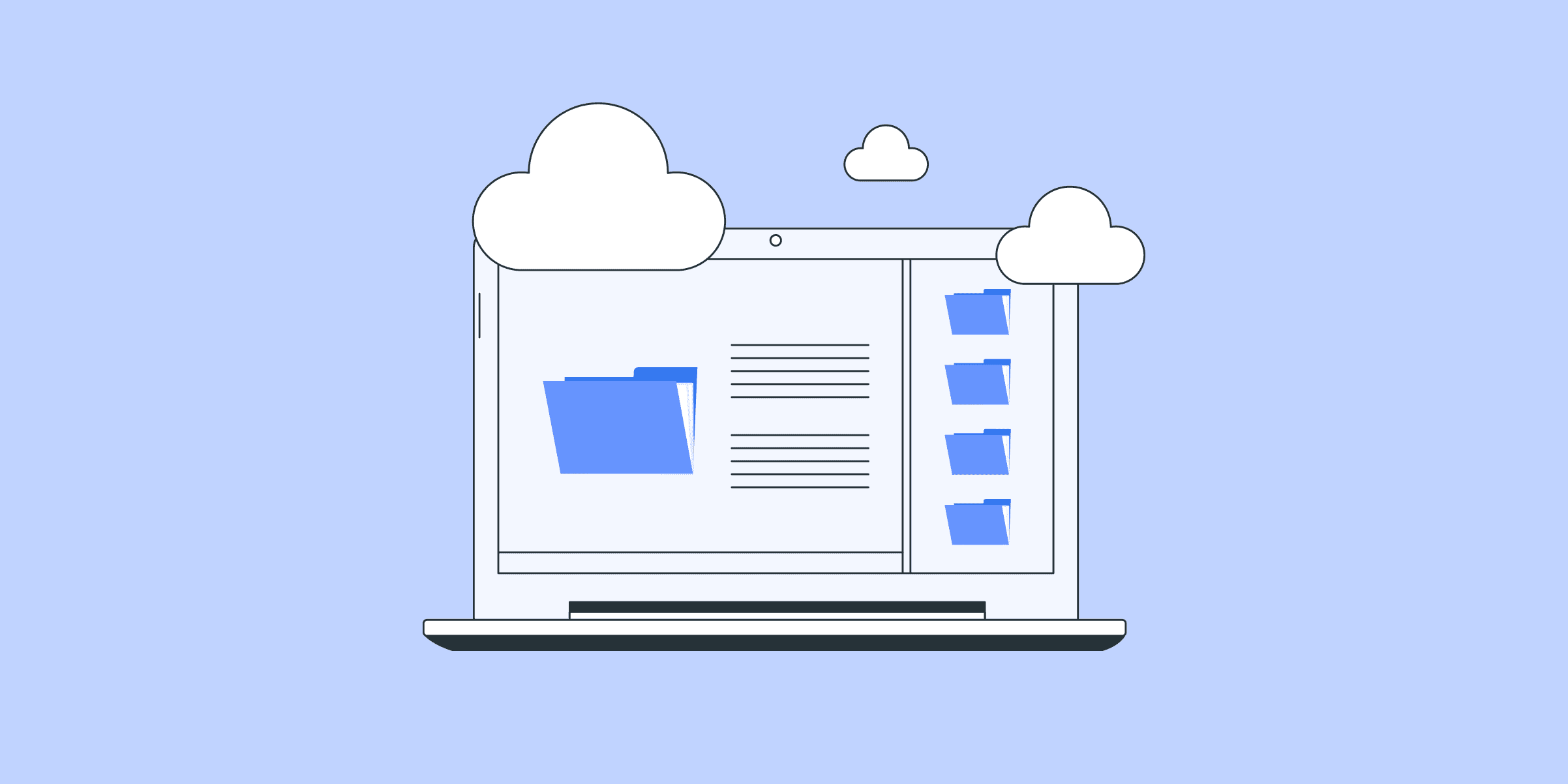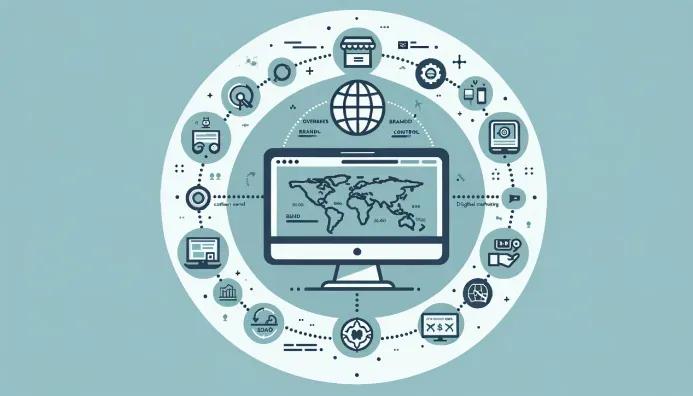
How is cross-border e-commerce Amazon store association determined? How to avoid the account being associated?
In the field of cross-border e-commerce, Amazon is a globally recognized platform that attracts many sellers to open stores on it. However, for some sellers, having multiple Amazon stores may be a necessity, but at the same time, they also face an important issue - how to avoid accounts being associated? In this article, we will explain how Amazon store association is determined and provide some ways to avoid accounts being associated to ensure smooth cross-border e-commerce operations. First, How Amazon store association is determined: 1.Sharing Linked Information: Amazon determines whether there is a link between accounts by sharing linked information. If two or more accounts share the same associated information, such as the same bank account, email address, phone number, etc., then these accounts will be determined as associated accounts. 2. Shared IP address: Amazon may detect whether accounts share the same IP address. If multiple accounts use the same IP address to log in or operate, they may be considered related accounts. 3. Shared devices: Amazon may also track whether accounts share the same device, such as the same computer or mobile device. If more than one account logs in or operates on the same device, it may also be considered a related account. 4. Similar store information: Amazon compares accounts' store information, including store name, description, and product listings. If the store information of multiple accounts is very similar, they may be recognized as associated accounts. Second, how to avoid the account being associated: 1. Use different associated information: Make sure that each account has independent associated information, including different bank accounts, email addresses, phone numbers, etc. Avoid sharing this information among multiple accounts to reduce the risk of being linked. 2. Use different IP addresses: Try to avoid multiple accounts using the same IP address for login or operation. Consider using different network environments or proxy services to ensure that each account has a separate IP address. 3. Avoid sharing devices: Try to avoid logging in or operating multiple accounts on the same computer or mobile device at the same time. You can use different devices or browsers to manage different accounts. 4. Regularly clear the browser cache and Cookies: Regularly clear the browser cache and Cookies to prevent Amazon from tracking account associations through this information. Third, how overseas proxies assist Amazon store accounts to avoid being associated By using an overseas residential proxy can effectively help Amazon store accounts avoid being associated, thus ensuring the independence and security of the account. Here are some specific methods to achieve this goal: 1. IP address segregation: using an overseas residential proxy can assign an independent IP address to each Amazon store account, avoiding the situation where multiple accounts share the same IP address. Doing so can reduce the risk of Amazon associated accounts, as Amazon may determine the relationship between accounts through IP addresses. 2. Regional positioning: Overseas residential proxies can provide IP addresses in different regions, and sellers can choose IP addresses in different regions to register and manage their Amazon store accounts according to their business needs. This can simulate the login behavior of different regions and avoid the association between accounts. 3. Separation of devices: When using an overseas residential proxy, you can log in and manage different Amazon accounts on different devices to avoid multiple accounts operating on the same device. This prevents Amazon from judging the relevance of accounts through device information. 4. Independent information: Ensure that each Amazon store account has independent associated information, including different bank accounts, email addresses, phone numbers, etc.. Avoid sharing this information among multiple accounts to reduce the risk of being associated. 5. Regularly Clear Cache and Cookies: Regularly clear your browser cache and cookies to prevent Amazon from tracking account associations through this information. Overseas residential proxies will provide different browser environments that can help sellers realize the purpose of regular cleaning. It should be noted that although using an overseas residential proxy can reduce the risk of Amazon store accounts being associated, it does not completely eliminate the risk. In order to ensure the security of the account, sellers also need to comply with the rules and policies of the Amazon platform, operate legally and compliantly, and avoid the adverse consequences of violations. At the same time, it is also very important to choose a credible overseas residential proxy service provider to ensure that the proxy IP address it provides is high-quality, stable and reliable to ensure the safety and stable operation of the account.

How Proxies Help SEOs Overcome Common Challenges
Search engine optimization (SEO) is crucial for improving website visibility and attracting organic traffic. However, modern SEOs face many challenges including frequent IP bans, geographic restrictions, data limits, and more. This is where proxy servers can provide invaluable solutions. As intermediaries between users and the internet, proxies allow SEOs to mask their identity and bypass many restrictive barriers. This article will explore the key ways proxies help SEOs overcome challenges and excel at search optimization. We’ll look at how proxies enable accurate ranking monitoring, efficient data gathering, scaled campaign management, competitor research, and other benefits. By leveraging the right proxies, SEOs can gain significant strategic advantages. Proxies for Accurate Keyword Rank Tracking Monitoring keyword rankings consistently over time is vital for gauging SEO strategy effectiveness. However, frequently checking rankings from a static IP risks getting banned by Google. Proxies provide fresh IP addresses to run rank checks at scale without tripping alarms. Proxies also let SEOs view keyword rankings from IPs worldwide. Since search results vary by location, this global viewpoint exposes opportunities and weak areas. Proxies are invaluable for comprehensive, unbiased rank tracking. Enabling Efficient Data Gathering and Analysis Data is the fuel for effective SEO. Proxies empower SEOs to extract huge datasets via web scraping without getting blocked. By rotating proxy IPs, SEOs can gather content, backlink profiles, reviews, pricing data, and other intelligence at scale for analysis. Proxies also bypass geographic restrictions, enabling access to localized competitive intelligence. And by masking identities, SEOs can ethically scrape data on competitors for objective analysis. Managing SEO Campaigns and Scaling Globally Many SEO tasks like link building and content generation are best performed at scale. However, platforms like Google Ads limit the number of campaigns per IP. With proxies providing fresh IP addresses, SEOs can create and manage limitless campaigns simultaneously. Proxies also enable running localized campaigns in specific countries by presenting IPs from desired regions. And on-page optimizations can be tested locally through proxies before deploying changes globally. Additional Proxy Advantages for SEO For researching competitors, proxies allow SEOs to analyze sites anonymously without leaving footprints. This confidentiality makes data more reliable. Proxies also add a layer of security against cyber threats by hiding actual IPs. And by caching content, proxies can accelerate page load times and improve site performance. Conclusion Proxies provide versatile solutions to many modern SEO challenges. Their ability to enable accurate rank tracking, efficient data extraction, scaled campaign management, and competitor analysis make proxies invaluable assets for SEO success. Key Takeaways: - Proxies bypass IP bans for continuous rank monitoring globally- Facilitate large-scale web scraping and competitive analysis - Allow managing limitless campaigns simultaneously - Provide security and anonymity benefits- Help accelerate site speeds and optimization testing For SEOs to gain a competitive edge, leveraging reliable, high-performing proxies is a must. As search optimization and internet technologies progress, proxies will likely continue playing an integral role in empowering SEOs with the tools to overcome obstacles and achieve success.

How Proxy Browsers Can Keep You Safe and Secure Online
Title: The Benefits of Using a Proxy Browser for Enhanced Online Security and PrivacyIntro.In today's digital age, internet users are becoming increasingly concerned about their online security and privacy. With cyber threats and data breaches on the rise, it has become more important than ever to take proactive measures to protect our personal information and browsing activities. One tool that can help in this regard is a proxy browser.A proxy browser, also known as a web proxy, acts as an intermediary between the user and the website they want to visit. When a user accesses a website through a proxy browser, their IP address is masked, making it difficult for websites to track their online activities. This added layer of anonymity can help protect users from online tracking, targeted advertising, and other privacy risks.SecurityOne of the key benefits of using a proxy browser is enhanced online security. By masking your IP address, a proxy browser helps protect your identity and location from being exposed to malicious actors. This can be especially useful when accessing public Wi-Fi networks, which are vulnerable to cyber attacks. With a proxy browser, you can browse the internet with peace of mind, knowing that your personal information is secure.In addition to security benefits, a proxy browser can also help users bypass geo-restrictions and access blocked content. Some websites and online services are only available in certain regions, making it difficult for users in other countries to access them. By using a proxy browser with servers located in different regions, users can easily change their virtual location and access geo-blocked content.Furthermore, a proxy browser can improve browsing speed and performance by caching frequently accessed web pages. This can reduce loading times and bandwidth usage, especially for users with slow internet connections. By optimizing data transmission and reducing server load, a proxy browser can offer a smoother and faster browsing experience.Another advantage of using a proxy browser is the ability to maintain multiple online identities. This can be useful for users who want to separate their personal and professional online activities, or for those who want to create accounts on websites without revealing their real identity. With a proxy browser, users can easily switch between different IP addresses and personas, enhancing their online privacy and security.ConclusionIn conclusion, a proxy browser offers a range of benefits for users looking to enhance their online security and privacy. By masking your IP address, bypassing geo-restrictions, improving browsing speed, and maintaining multiple online identities, a proxy browser can help protect your personal information and browsing activities. Whether you are concerned about online tracking, data breaches, or restricted content, using a proxy browser can provide a safer and more private browsing experience. Take control of your online security today with a proxy browser!

How Proxy IPs Benefit Transforming Enterprises
In the current wave of digital transformation, enterprises face unprecedented challenges and opportunities. Transforming enterprises need to quickly adapt to market changes, enhance operational efficiency, and improve competitiveness. As a technical tool, proxy IPs play a crucial role in driving the digital transformation of enterprises. This article explores how proxy IPs help transforming enterprises achieve their goals.What is a Proxy IP?A Proxy IP is a technology that routes network traffic through a proxy server, thereby hiding the user's real IP address and enabling anonymous access to network resources. Depending on their usage and configuration, proxy IPs can be categorized into different types, such as HTTP proxies, HTTPS proxies, and Socks proxies.Specific Benefits of Proxy IPs for Transforming Enterprises1. Protecting Corporate Data SecurityDuring the digital transformation process, enterprises handle large amounts of sensitive data, including customer information and transaction records. Proxy IPs can hide the real IP addresses of enterprises, reducing the risk of hacker attacks. Additionally, proxy IPs can prevent data traffic from being intercepted and tampered with, ensuring the integrity and confidentiality of data.2. Enhancing Network Access Speed and StabilityProxy IPs can improve the speed and stability of network access for enterprises through traffic distribution and load balancing. This is especially important for enterprises that need frequent access to external resources or large-scale data transmission. For example, e-commerce companies can use proxy IPs to increase website access speeds, enhance user experience, and thus increase sales conversion rates.3. Overcoming Regional Restrictions and Expanding Business ReachMany countries and regions impose restrictions on internet access, posing challenges to the global operations of enterprises. By using proxy IPs, enterprises can bypass regional restrictions and access network resources worldwide. This is particularly important for companies looking to expand their international markets. For instance, market research firms can use proxy IPs to access websites from various countries, collect market data and competitive information, and develop more accurate marketing strategies.4. Improving Network Marketing EffectivenessDigital marketing is a crucial component of enterprise transformation, and proxy IPs can help enterprises enhance their network marketing effectiveness. Through proxy IPs, enterprises can manage multiple accounts, increasing the efficiency of social media operations. Additionally, companies can use proxy IPs for web scraping to gather data on competitors and industry trends, optimizing their own marketing strategies.5. Reducing Operational CostsUsing proxy IPs can help enterprises lower operational costs. For example, companies can use proxy IPs for traffic testing to determine the best advertising strategies, reducing unnecessary ad spending. Furthermore, proxy IPs can assist enterprises in price monitoring to identify the most optimal supply chain management solutions, thereby lowering procurement costs.ConclusionDuring the process of digital transformation, enterprises need to continuously seek innovation and change to maintain their competitive edge. As a powerful technical tool, proxy IPs can support transforming enterprises in multiple ways, including protecting data security, enhancing network access speed, overcoming regional restrictions, improving marketing effectiveness, and reducing operational costs. Therefore, enterprises should actively explore and apply proxy IP technology to aid in their digital transformation journey.

How Proxy IPs Can Enhance Mobile User Experience
With the widespread adoption of smartphones, more people rely on their mobile devices for everyday activities such as browsing the web, shopping, interacting on social media, and working. However, during these activities, users often encounter issues such as geographical restrictions, network privacy concerns, and access speeds. A proxy IP is an effective tool to address these problems. This article will detail how proxy IPs can enhance the online experience for mobile users.What is a Proxy IP?A proxy IP is an intermediary IP address that allows users to hide their real IP, thereby changing their online location and enhancing network security. Proxy IPs come in various types, including HTTP proxies, HTTPS proxies, and SOCKS proxies.Main Functions of Proxy IPsBypassing Geographical Restrictions: Some websites and applications impose access restrictions based on location, such as streaming services and game servers. By using a proxy IP, users can easily change their IP address to bypass these restrictions and access blocked content.Protecting Privacy: In public Wi-Fi environments, using a proxy IP can hide the real IP address, preventing personal information from being stolen by hackers. Additionally, proxy IPs can prevent online tracking, protecting users' online privacy.Enhancing Access Speed: Some proxy IP servers offer high bandwidth and low latency, which can significantly improve network access speed. This is especially beneficial when accessing overseas websites, as a quality proxy IP can noticeably reduce loading times.Managing Multiple Accounts: For users who need to manage multiple social media accounts, a proxy IP is an essential tool. Different IP addresses can prevent the same device from logging into multiple accounts, which can be flagged as suspicious activity by platforms, thereby reducing the risk of account suspension.How to Use Proxy IP on Mobile Devices?Setting up a proxy IP on a mobile device is straightforward, as most smartphone operating systems support proxy IP settings. Below are simple steps for iOS and Android devices:iOSOpen the “Settings” app and go to “Wi-Fi” settings.Tap the “i” icon next to the connected Wi-Fi network.Scroll down to the “HTTP Proxy” section and select “Manual”.Enter the proxy server's IP address and port number, and save the settings.AndroidOpen the “Settings” app and go to “Wi-Fi” settings.Long press the connected Wi-Fi network and select “Modify network”.Check “Show advanced options” and find the “Proxy” setting.Choose “Manual” and enter the proxy server's IP address and port number, then save the settings.Considerations When Using Proxy IPsChoose a Reliable Proxy Service: There are many free and paid proxy services available, but free proxies are often unstable and pose security risks. It is advisable to choose a reputable paid proxy service to ensure stability and security.Regularly Change IPs: Using the same IP address for an extended period might get detected by websites or servers. It is recommended to regularly change proxy IPs to maintain anonymity.Check IP Source: When choosing a proxy IP, pay attention to the geographical location of the IP address to avoid selecting IPs from regions with heavy restrictions or slower network speeds.ConclusionProxy IPs offer significant benefits for mobile users, whether it's bypassing geographical restrictions, protecting privacy, or enhancing access speeds. When choosing and using proxy IPs, ensure security and stability for the best online experience. We hope this article helps you better understand and utilize proxy IPs to improve the convenience and security of your mobile internet usage.

How Proxy IPs Can Transform Your Online Experience
As the internet becomes an integral part of our daily lives, the need for tools that enhance our online experience is more crucial than ever. Proxy IPs are among the most versatile tools available, offering a range of benefits from improved security to enhanced access to information. In this article, we'll explore how proxy IPs can transform your online experience.The Role of Proxy IPs in Online SecurityOne of the primary reasons users turn to proxy IPs is to bolster their online security. When you connect to the internet through a proxy server, your IP address is masked, making it difficult for malicious entities to track your online activities or launch targeted attacks. This added layer of security is particularly valuable when using public Wi-Fi networks, which are often vulnerable to cyber threats.Bypassing Geo-restrictions and CensorshipGeo-restrictions and censorship can significantly limit your access to information and entertainment. Proxy IPs can help you overcome these barriers by routing your internet traffic through servers located in different regions. This makes it appear as though you're accessing the internet from a different location, allowing you to bypass regional restrictions and access content that would otherwise be unavailable.For example, if you're traveling abroad and want to access your favorite streaming service that is restricted in the country you're visiting, a proxy IP can make this possible. Similarly, proxies can help individuals in countries with strict internet censorship access uncensored information and communicate freely.Improving Network Performance and EfficiencyProxy IPs can also enhance network performance and efficiency. By caching frequently accessed content, proxy servers reduce the amount of data that needs to be transmitted over the network. This not only saves bandwidth but also speeds up access to commonly visited websites and online resources. For businesses, this can translate to cost savings and improved productivity as employees experience faster and more reliable internet connections.Anonymity for Sensitive Research and Web ScrapingFor researchers and data analysts, maintaining anonymity is crucial, especially when conducting sensitive research or web scraping. Proxy IPs provide the necessary anonymity by masking the researcher's IP address, preventing websites from detecting and blocking their activities. This allows for the collection of unbiased data and ensures that research efforts are not hindered by IP-based restrictions.Enhancing Online Marketing and SEO EffortsIn the realm of online marketing and SEO, proxy IPs play a significant role. Marketers can use proxies to access region-specific search engine results and monitor competitors' websites without revealing their identity. This helps in developing effective marketing strategies and optimizing websites for better search engine rankings. Additionally, proxies enable automated tasks such as ad verification, ensuring that ads are displayed correctly and preventing ad fraud.ConclusionProxy IPs are powerful tools that can significantly enhance your online experience. From improving security and bypassing geo-restrictions to boosting network performance and enabling anonymous research, the benefits of proxy IPs are extensive. As you navigate the complexities of the digital world, leveraging proxy IPs can help you stay secure, access the information you need, and optimize your online activities.Whether you're an individual seeking to protect your privacy or a business looking to enhance your online operations, proxy IPs offer solutions that can transform the way you interact with the internet. Stay informed and make the most of these versatile tools to enjoy a safer, more efficient, and unrestricted online experience.

How Proxy IPs Empower Business Operations?
In today's digitalized business environment, enterprises need to constantly innovate and adapt to remain competitive. Proxy IPs, as a technological tool, have become an integral part of many businesses' efforts to optimize operations, protect privacy, and enhance security. This article will explore how proxy IPs empower business operations and introduce their applications in different fields.What are Proxy IPs?Proxy IPs are a networking technology that allows users to hide their real IP addresses on the internet and instead use the IP address of a proxy server as their intermediary. This enables users to browse websites, access content, and bypass geographical restrictions or firewalls while maintaining anonymity.How do Proxy IPs Empower Business Operations?Data Collection and Web Scraping: Enterprises may need to gather large amounts of data from the internet for market research, competitive analysis, or price monitoring. Proxy IPs enable businesses to scrape information from target websites easily without risking being banned or restricted.Privacy and Security Protection: When conducting market research or collecting competitive intelligence, enterprises may prefer not to reveal their real identities and locations. By using proxy IPs, businesses can hide their actual IP addresses, ensuring the anonymity and security of data collection.Overcoming Geographical Restrictions: Some websites or services restrict access to specific regions, which can hinder enterprises' global operations. Using proxy IPs can help businesses bypass these geographical restrictions and access the desired content or services.Enhancing Network Security: Enterprises can use proxy IPs to filter out malicious traffic, prevent network attacks, or protect the transmission of sensitive data. Proxy IPs can act as a firewall between the enterprise and the external network, monitoring and filtering incoming and outgoing traffic to enhance network security and stability.Distributed Deployment and Load Balancing: By using proxy IPs, enterprises can achieve distributed deployment and load balancing, distributing network traffic across multiple proxy servers to improve network performance and reliability.Applications of Proxy IPs in Different IndustriesE-commerce: E-commerce businesses can use proxy IPs to monitor competitors' price changes, collect user reviews and feedback, and analyze market trends to formulate more effective marketing strategies.Financial Services: Financial institutions can use proxy IPs to protect client data privacy and security, prevent network attacks and fraud, as well as conduct anti-fraud detection and risk management.Travel and Hospitality: Travel and hospitality businesses can use proxy IPs to collect user reviews and feedback on destinations and accommodation facilities, monitor competitors' prices and promotions, and optimize products and services accordingly.Healthcare: Healthcare institutions can use proxy IPs to protect patient data privacy and security, conduct medical research and data analysis, and communicate and collaborate with medical equipment and pharmaceutical suppliers.Education and Research: Educational and research institutions can use proxy IPs to collect academic literature and research data, access international journals and databases, and engage in academic exchanges and collaborations with international partners.In summary, proxy IPs, as a powerful tool, can help enterprises optimize operations, protect privacy, and enhance security, playing important roles in various industries and fields. With the continuous development of the internet and technological advancements, proxy IPs will continue to play an increasingly important role, becoming a key support for enterprises' digital transformation and global operations.

How Proxy IPs Empower Cross-Border E-commerce Business?
With the acceleration of globalization and the booming development of cross-border e-commerce, an increasing number of businesses are seeking to expand their operations into overseas markets. However, faced with various challenges of cross-border e-commerce, such as geographical restrictions and IP blocks, businesses need to find effective solutions. The application of proxy IP technology has become a key weapon for many cross-border e-commerce operations.What are Proxy IPs?Proxy IP is a technology that forwards network requests through an intermediary server. By using proxy IPs, the user's real IP address is hidden, while different geographical IP addresses can be simulated. This allows users to browse websites and access services through proxy IPs without being restricted or blocked.How do Proxy IPs Empower Cross-Border E-commerce Business?Overcoming Geographical Restrictions: Many cross-border e-commerce platforms restrict access or provide different content and prices based on the user's geographical location. By using proxy IPs, businesses can simulate different geographical locations, allowing them to freely access platforms in target markets to obtain the required information and resources.Addressing IP Blocking Issues: Some cross-border e-commerce platforms may block specific IP addresses, such as those marked as malicious due to excessive access or other reasons. By using proxy IPs, businesses can easily change IP addresses, thereby avoiding being blocked and maintaining continuous access and business operations.Market Price Competitiveness: The cross-border e-commerce market is highly competitive, with significant price fluctuations. Utilizing proxy IPs, businesses can track market price changes in real-time, understand competitors' pricing strategies, and develop more competitive pricing strategies, enhancing business competitiveness.Optimizing Advertising Campaigns: Through proxy IPs, businesses can simulate users from different regions, enabling precise ad targeting. This helps businesses better understand the needs and preferences of different markets, adjust product and marketing strategies, and improve the effectiveness and ROI of advertising campaigns.Enhancing Data Collection and Analysis: Cross-border e-commerce operations require extensive market and competitor data analysis to formulate effective business strategies. Proxy IPs can help businesses obtain data from various regions, conduct comprehensive and accurate market research and competitive analysis, and provide strong support for business decision-making.ConclusionThe application of proxy IP technology brings great convenience and advantages to cross-border e-commerce operations, helping businesses overcome geographical restrictions, address IP blocking issues, optimize market competition strategies, and improve business efficiency and competitiveness. However, businesses should also be mindful of legal compliance when using proxy IPs, adhering to relevant laws, regulations, and platform rules to ensure the stability and sustainability of business operations.

How Proxy IPs Enhance Overseas TikTok Operations
As TikTok becomes one of the most popular short video platforms globally, more users and businesses aim to expand their influence in overseas markets. However, operating TikTok accounts in different countries presents several challenges, such as regional restrictions and difficulties in content promotion. Proxy IP technology is a major aid in overcoming these issues. This article will explore how proxy IPs help users run TikTok accounts overseas and enhance operational effectiveness.What is a Proxy IP?A proxy IP is a technology that allows users to access the internet through an intermediary server. When users access a website using a proxy IP, their actual IP address is hidden and replaced by the proxy server's IP address. This technology not only protects user privacy but also bypasses regional restrictions, enhancing network access speed and stability.Applications of Proxy IPs in Overseas TikTok OperationsBypassing Regional Restrictions: TikTok may have access restrictions or content filtering in certain countries and regions. By using proxy IPs, users can simulate IP addresses from different regions, bypass these restrictions, and smoothly access and operate TikTok accounts.Managing Multiple Accounts: To cover more markets, users might need to operate multiple TikTok accounts. Using proxy IPs can prevent the risk of platform bans for operating multiple accounts from the same IP address, allowing safer and more efficient management of multiple accounts.Targeted Content Promotion: User preferences vary across different regions. With proxy IPs, users can simulate traffic from target markets, test, and optimize content promotion strategies to ensure that the published content aligns better with local user preferences, increasing engagement and follower count.Competitor Analysis: Understanding competitors' operational strategies in local markets is crucial for success. Proxy IPs allow users to anonymously access competitors' TikTok accounts, observe their content and interaction, and develop more targeted operational strategies.Advantages of Using Proxy IPsIncreased Operational Efficiency: Proxy IPs allow users to operate multiple accounts simultaneously, improving work efficiency and saving time and resources.Privacy Protection: Hiding the real IP address effectively protects user privacy and data security, avoiding potential risks from IP exposure.Flexible Region Switching: Easily switch to IP addresses from different regions, facilitating global operations and expanding market reach.Stable Connection: High-quality proxy IP services provide stable and fast network connections, ensuring continuous and smooth TikTok account operations.ConclusionProxy IPs play an important role in overseas TikTok operations. By flexibly using proxy IPs, users can effectively bypass regional restrictions, manage multiple accounts, promote content precisely, and analyze competitors, thereby enhancing operational effectiveness. As TikTok's global influence continues to grow, proxy IPs will become a key tool for users to improve their competitiveness and business performance.

How Proxy IPs Help B2B Companies Expand Their Overseas Business
In today's globalized economy, expanding overseas is a key strategy for many B2B companies seeking growth. However, entering new markets comes with its own set of challenges. One powerful tool that can significantly aid in this endeavor is the use of proxy IPs. This article explores how proxy IPs can help B2B companies expand their overseas business.1. Access to Geo-Restricted Market DataUnderstanding the target market is crucial for any successful expansion. Proxy IPs enable B2B companies to access geo-restricted websites and gather valuable market data that would otherwise be unavailable. By using proxy IPs from different regions, companies can view localized content, monitor regional trends, and analyze competitor strategies in various markets. This insight helps in making informed decisions and tailoring products or services to meet local demands.2. Conducting Market ResearchProxy IPs facilitate comprehensive market research by allowing businesses to browse the internet as if they were local users in the target market. This helps in gathering accurate information about potential customers, industry standards, and regulatory requirements. For instance, a company can use a proxy IP from Germany to research German businesses, consumer behavior, and legal frameworks, ensuring their entry strategy is well-informed and compliant with local laws.3. Competitive AnalysisStaying ahead of the competition is vital in any market. Proxy IPs allow B2B companies to conduct thorough competitive analysis by accessing competitors' websites and marketing campaigns as they appear to local audiences. This enables companies to track pricing, promotions, and customer feedback in real-time. With this information, businesses can adjust their strategies to better compete in the new market.4. Localized AdvertisingEffective advertising is key to gaining a foothold in a new market. Proxy IPs help B2B companies test and optimize their advertising campaigns by simulating local user experiences. By using proxy IPs, companies can ensure that their ads are appropriately targeted and displayed, resonating with the local audience. This approach leads to higher engagement rates and a better return on investment (ROI) for advertising efforts.5. Bypassing Regional RestrictionsMany regions impose restrictions on certain websites or online services, which can hinder market research and business operations. Proxy IPs help B2B companies bypass these restrictions, ensuring uninterrupted access to necessary online resources. This is particularly useful for accessing global platforms, tools, and databases that may be restricted in specific countries.6. Enhancing CybersecurityExpanding into new markets often involves increased online activities, which can expose businesses to cyber threats. Proxy IPs add an extra layer of security by masking the company’s real IP address, making it harder for cybercriminals to target them. Additionally, some proxy services offer advanced security features like encryption and malware protection, further safeguarding the company's data and operations.7. Streamlining International CollaborationProxy IPs facilitate smoother collaboration with international partners and clients by ensuring consistent and reliable access to global online platforms. This is particularly beneficial for B2B companies that rely on cloud-based tools and services for project management, communication, and file sharing. By using proxy IPs, companies can avoid connectivity issues and maintain seamless interactions with overseas stakeholders.ConclusionProxy IPs offer a multitude of benefits for B2B companies looking to expand their overseas business. From gaining access to geo-restricted data and conducting in-depth market research to enhancing cybersecurity and optimizing localized advertising, proxy IPs are a versatile tool that can significantly ease the complexities of entering new markets. By leveraging the power of proxy IPs, B2B companies can better navigate the challenges of globalization and achieve successful international growth.

How Proxy IPs Help Cross-Border E-Commerce Quickly Promote Products
With the rapid development of cross-border e-commerce, how to quickly and effectively promote products has become a key concern for many e-commerce businesses. Proxy IP technology plays a significant role in this process. This article will explore the application and advantages of proxy IPs in cross-border e-commerce promotion.What is a Proxy IP?A proxy IP is a technology that allows users to access the internet through an intermediary server. When users access a website using a proxy IP, their actual IP address is hidden and replaced by the proxy server's IP address. This technology not only protects user privacy but also bypasses regional restrictions, enhancing network access speed and stability.Applications of Proxy IPs in Cross-Border E-CommerceMulti-Platform Operations: Cross-border e-commerce businesses often need to operate on multiple platforms such as Amazon, eBay, and Wish simultaneously. Using proxy IPs allows businesses to create and manage multiple accounts on different platforms without being detected as operating from the same IP address, thus reducing the risk of account bans.Regional Ad Placement: User preferences and demands vary across regions, requiring cross-border e-commerce to tailor ads for different markets. Proxy IPs can help businesses simulate user behavior in different regions, test ad effectiveness, optimize placement strategies, and improve ad ROI.Market Research: Understanding competitors' pricing strategies and market dynamics is crucial for cross-border e-commerce success. With proxy IPs, businesses can hide their identity and anonymously access competitors' websites for price and product analysis, thereby formulating more competitive marketing strategies.Preventing IP Bans: Cross-border e-commerce often encounters IP bans when conducting large-scale data scraping and price tracking. By using proxy IPs, businesses can change IP addresses as needed, avoiding bans from target websites and ensuring business continuity and stability.Advantages of Proxy IPsEnhanced Efficiency: Proxy IPs enable simultaneous operation of multiple accounts and platforms, improving work efficiency and saving time and labor costs.Privacy Protection: Hiding the real IP address effectively protects the business's data security and privacy, preventing potential risks from IP exposure.Bypassing Regional Restrictions: Easily access regionally restricted websites and services, expanding market reach and enhancing global competitiveness.Stable Operation: Proxy IP providers usually offer high-quality IP resources, ensuring stable and fast network access, and smooth business operations.ConclusionProxy IPs have undeniable value in cross-border e-commerce promotion. By flexibly using proxy IPs, businesses can more efficiently manage multi-platform accounts, precisely place ads, conduct market research, and effectively prevent IP ban issues. As competition in the cross-border e-commerce market intensifies, proxy IPs will become a crucial tool for businesses to enhance their competitiveness and operational levels.

How Proxy Servers Revolutionized Digital Marketing Analytics: A Historical Overview
Introduction In the ever-changing world of digital marketing, businesses and marketers constantly look for innovative technologies that can provide a competitive edge. One such technology that has significantly influenced the landscape is the proxy server. Initially designed for different objectives, proxy servers have become integral in advanced analytics, competitive strategy, and consumer behavior insights in digital marketing. This article delves deep into the historical evolution and transformational role that proxy servers have played in digital marketing analytics. Early Use of Proxies in Marketing Bypassing Geographical Restrictions In their infancy, proxy servers were primarily used to bypass geographical content restrictions imposed by service providers or governments. Users employed proxy servers to access websites or content that were otherwise restricted in their location. The Shift to Marketing Soon, savvy digital marketers identified the potential of proxy servers beyond bypassing geo-restrictions. They realized that proxies could be instrumental in collecting valuable data that could inform and shape marketing strategies. Marketers started using proxies to gain insights into user behavior, demographic segmentation, and consumer preferences. The Role of Proxies in Analytics Data Scraping Proxy servers became essential tools for data scraping and web crawling. Marketers used them to collect information on consumer preferences, emerging trends, and even competitor pricing. This anonymous data gathering enabled businesses to offer more targeted and relevant content and advertisements, increasing both engagement and conversion rates. Competitive Analysis Proxies have allowed marketers to discreetly analyze competitors' strategies without revealing their identity or intentions. This stealthy form of market research has led to more dynamic and competitive pricing models, a better understanding of feature comparisons, and insights into user engagement tactics. Load Testing Before launching a new product or a major marketing campaign, it's crucial for businesses to understand how their digital platforms will perform under pressure. Proxies make it possible to simulate real-world traffic conditions to test how websites and apps would respond during high-traffic events. This aids in performance optimization and avoids the risk of website crashes during crucial moments. Case Study: SEO Tracking Tools SEO, or Search Engine Optimization, is pivotal for digital marketing. Accurate tracking of keyword rankings across various locations is critical for a well-rounded SEO strategy. SEO tracking tools often utilize proxy servers to simulate searches from different geographical locations, which provides more accurate, local-specific data. This granular level of information has given businesses the ability to develop global SEO strategies without sacrificing local relevancy. Future Trends Smarter Proxies (LIKE.TG Proxy Provider) As we advance further into the digital age, proxies are becoming smarter. Advanced, AI-driven proxy servers are being developed that offer real-time analytics and insights. These intelligent proxies are expected to automatically adjust marketing strategies based on real-time data, making campaigns more responsive and effective. Decentralized Networks Blockchain technology is beginning to make its way into proxy server development. These decentralized networks offer enhanced security and greater transparency. As both these qualities are extremely valuable in data analytics and consumer trust, the adoption of blockchain in proxy servers is a trend to watch closely. Conclusion The journey of proxy servers from simple tools for bypassing geographical restrictions to essential elements in advanced digital marketing analytics has been remarkable. The role of proxy servers has evolved considerably, offering capabilities that have enriched analytics, competitive strategies, and user experience. With emerging technologies like AI and blockchain, the relationship between proxy servers and digital marketing is bound to become more intricate and impactful. The future promises even more dynamic and responsive digital marketing strategies, all thanks to the ongoing evolution of proxy technology.

How Proxy Sites Can Enhance Your Online Browsing Experience
IntroductionProxy websites have become increasingly popular in recent years as more and more Internet users seek to protect their privacy and access restricted content. In this blog post, we'll explore the concept of proxy websites, how they work, and the benefits they bring to users. What is a proxy site? A proxy site is an intermediary between a user's device and the Internet. When you connect to the Internet through a proxy site, your request is first sent to a proxy server, which then forwards it to the target site. This process helps to hide your IP address and encrypt your data, providing you with additional security and privacy protection.How do proxy websites work? Proxy websites work by masking your IP address and location, making it difficult for websites to track your online activities. By using a proxy server, you can bypass geo-blocking restrictions and access content that may not be available in your area. In addition, proxy sites can encrypt your data and protect you from online threats such as hackers and malware, thus increasing your online security.Benefits of using a proxy site 1. **Privacy Protection:** Proxy websites protect your online privacy by hiding your IP address and encrypting your data. This makes it difficult for websites and third parties to track your online activities. 2. **Access to Restricted Content:** Proxy sites allow you to bypass geo-blocking restrictions and access content that may be blocked in your area. This includes streaming services, social media platforms, and websites that are not accessible in your country. 3. **Increased Security:** By routing your Internet traffic through a proxy server, you can protect yourself from cyber threats such as hackers, malware and phishing attacks. Proxy sites help encrypt your data from prying eyes. 4. **Faster Internet Speeds:** In some cases, using a proxy site can increase Internet speeds by caching frequently visited content and reducing the load on the target web server. This can result in a smoother, faster browsing experience. 5. **Anonymity:** Proxy websites provide you with a degree of anonymity, making it more difficult for websites to identify you and track your online behaviour. This is particularly useful for users who wish to maintain privacy while browsing the web.Conclusion In conclusion, proxy websites offer a range of benefits for users who wish to protect their privacy, access restricted content and improve their online security. By using a proxy server, you can mask IP addresses, encrypt data and browse the Internet anonymously. Whether you are concerned about online privacy, security, or accessing geographically restricted content, proxy sites can help you achieve your goals.

How Shadowrocket Revolutionized Mobile Proxy Services
Title: Exploring Shadowrocket: A Comprehensive Guide to Secure Internet AccessIn an age where internet privacy and security are paramount, finding the right tools to protect your online activities is crucial. One such tool that has gained popularity among iOS users is Shadowrocket. In this comprehensive guide, we'll delve into the world of Shadowrocket, exploring its features, benefits, and how it can help you achieve secure and private internet access on your iOS device.What is Shadowrocket?Shadowrocket is a powerful iOS app that allows users to configure proxies, and rules to control internet traffic. Developed by Shadow Launch Technology Limited, Shadowrocket provides users with the ability to bypass censorship, access geo-restricted content, and enhance their online privacy and security.Key Features of Shadowrocket1. Proxy Support: Shadowrocket supports proxy connections, allowing users to route their internet traffic through secure servers located around the world. Whether you're accessing public Wi-Fi networks or browsing the web from a restricted region, Shadowrocket offers reliable encryption and anonymity to protect your data.2.Custom Rules Configuration: One of Shadowrocket's standout features is its support for custom rules configuration. Users can define rules to selectively route internet traffic based on criteria such as domain, IP address, or network type. This enables fine-grained control over which connections are routed through proxies, ensuring maximum flexibility and efficiency.3.Ad Blocking and Content Filtering: Shadowrocket includes built-in support for ad blocking and content filtering, allowing users to block ads, trackers, and malicious content at the network level. By filtering out unwanted content before it reaches your device, Shadowrocket helps improve browsing speed, reduce data usage, and enhance overall security.4.DNS Override and Smart Routing: Shadowrocket allows users to override DNS settings and configure smart routing for specific domains or IP addresses. This can be useful for bypassing DNS-based censorship, accessing region-restricted content, or improving connection stability by routing traffic through optimized servers.How to Use Shadowrocket1.Download and Install: Shadowrocket is available for purchase on the App Store. Once installed, launch the app on your iOS device.2.Add Proxy Configuration: Tap the "+" button to add a proxy configuration. Enter the necessary details, such as server hostname, port, authentication credentials, and encryption settings.3.Configure Custom Rules: Customize the app's behavior by creating rules to route internet traffic based on your preferences. You can define rules to match specific domains, IP addresses, or network types and specify the action to take for each match 4.Activate Proxy Connection: Once configured, activate the proxy connection by toggling the switch next to the configured profile. Shadowrocket will establish a secure connection and route your internet traffic according to the configured rules.ConclusionShadowrocket is a versatile and feature-rich iOS app that empowers users to take control of their internet access. Whether you're concerned about privacy, censorship, or accessing geo-restricted content, Shadowrocket provides a comprehensive solution for secure and private internet browsing on your iOS device. By leveraging its advanced features such as custom rules configuration, and ad blocking, you can enjoy a safer, faster, and more seamless online experience wherever you go

How Social Media Transformed College Students' News Habits
The advent of social media has fundamentally reshaped how college students consume news. Where once students actively sought out news from traditional sources like newspapers and TV, now endless streams of content come to them through platforms like Facebook, Twitter, and Snapchat. This shift from active to passive news consumption, formation of new media habits, and the continued role of traditional media has transformed the student news experience. Active Choice, Passive Consumption For decades, consuming news and information required an active choice and intentional effort by individuals. Reading a newspaper meant physically obtaining a print copy, turning the pages, and selectively reading articles. Watching television news involved turning on the TV, selecting a station or program, and concentrating on the broadcast. Even visiting news websites required actively navigating to a specific URL in order to access content. The rise of social media has fundamentally altered this relationship by enabling much more passive consumption of news. The main difference lies in how content is delivered to audiences. With traditional media, the onus was on consumers to seek out news and information through their own active choices. But social platforms flip this pattern by actively delivering content to users without any effort required on their part. After making some initial active choices to follow certain accounts, subscribe to news alerts, or personalize content feeds, users are then presented with an endless stream of updates and information with no further action needed. The content comes to them. This creates a more passive consumption environment where users scroll through updates without much conscious thought or intentionality behind their news intake. Various studies reveal that college students actively seek out news from digital and social media at first. They intentionally add news organizations, journalists, and influencers to their social feeds on platforms like Facebook, Twitter, Instagram, and Snapchat. However, once these active preferences are set, the actual consumption of news becomes much more passive in nature. The design of social platforms facilitates this shift. Features like endless scrolling and content recommendations based on past behaviors remove the need for users to actively seek out news items themselves. The social media environment makes it remarkably easy to slip into autopilot mode, passively consuming post after post without any deliberate choice. Researchers have found that college students end up spending significantly more time passively consuming user-generated news content on social media than they originally intended when they made the initial active choice to access these platforms. This suggests that after the original active decision to use social media for news, the actual intake becomes increasingly passive. The platforms effectively remove the need for ongoing active selection. Furthermore, the ubiquity and convenience of mobile technology has enhanced these passive consumption tendencies. Smartphones give users constant access to tap into the passive stream of social media news at any moment of boredom or downtime throughout the day. This ambient, always-available, passive consumption further ingrains social media news habits among college students. In summary, while college students actively choose to use social platforms for news at first, the actual consumption patterns quickly morph into much more passive intake. The endless stream of content served to users removes the need for continued active selection. This understanding of the active-to-passive shift enabled by social media provides important context about the transformation of news habits among college students in the digital age. New Media Consumption Habits The rise of social media as a news source has led to the formation of entirely new media consumption habits among college students. Habit formation theory explains how when behaviors are repeated consistently over time, they can morph into automatic actions that are performed habitually with minimal conscious thought and effort. Obtaining news from social platforms perfectly fits this model. What originally starts as an intentional, active choice to get news from sites like Facebook and Twitter evolves into a daily habit through recurrent use. The act of checking social media for news updates shifts from being an active decision to becoming an ingrained habit. Several new media consumption habits centered around social platforms are now commonplace among college students. Scrolling endlessly through Facebook feeds, checking Twitter at routine intervals, and glancing at smartphone notification from news apps have all become habitual behaviors that students engage in automatically as part of their daily routines. These habits form because social media usage becomes a repeated, rewarding behavior. Features like personalized news feeds and "Like" buttons activate the brain's reward centers. Students feel compelled to check back frequently to get fresh content and validation. The more this cycle repeats, the more habitual the behavior becomes. Social media companies actively encourage this process through engineered habits. Platform algorithms learn from user data to serve personalized content that will maximize engagement. Push notifications tap into psychological tendencies, trained through variable reward reinforcement. All of this nudges users from intentional, active consumption toward passive, habitual usage. Additionally, the ubiquitous access to social media through smartphones enhances habit formation. With a tap, news is available 24/7, enabling students to form habits of accessing platforms continually throughout the day during any bored or transitional moment. This consistent repetition further ingrains social media news habits. In surveys, college students readily admit to habitual social media news consumption, with a majority reporting they check platforms like Facebook multiple times per day without even thinking about it. The initial active decision to use social media for news has clearly evolved into a set of habits demonstrating more passive, repetitive consumption. This understanding of how social media fosters new habitual media consumption behaviors among college students provides unique insight. It explains how previously intentional actions transform into passive, rote, habitual engagement. These habitual media consumption patterns will likely persist and shape how students get their news long into the future. Impact on Traditional Media The meteoric rise of digital and social media led some to predict the imminent demise of traditional news platforms, including print newspapers, broadcast TV news, and radio. However, current research reveals a much more complex and nuanced relationship between new and old media. In the early days of the web, some scholars assumed that college students would completely abandon traditional news outlets in favor of flashy new digital options. But data now clearly shows students still actively use and value both legacy and emerging media formats. They just do so in different ways and for different needs. Rather than directly competing against each other in a zero-sum game, social media and traditional news channels actually complement one another. Each format serves distinct purposes for students. For example, a student may first hear about a major developing news event on Twitter or Facebook through the passive stream. But they then seek out more in-depth coverage and analysis on that topic from traditional outlets like newspapers, TV news, radio, or news websites. Similarly, a student may watch an important story on the nightly network news, sparking interest to discuss and share the news with their peers on social platforms. Traditional media drives the discovery, while social media enables the discussion. In this manner, the two categories of media augment each other. Social media provides the always-on passive stream to stay constantly updated. But traditional media fills the need to dive deeper into stories and gain more thoughtful reporting and narrative. Each plays a unique role in keeping students informed and connected. This relationship explains why traditional news consumption remains resilient among college students, even amidst the social media explosion. In a recent study of students' daily media habits, over half reported reading a newspaper or visiting a newspaper website every day. Two-thirds said they get news from TV on a daily basis. While social media has clearly emerged as the first stop and main news source for college students, traditional media still fills important gaps in coverage and analysis. After hearing about a story on social media, students intentionally seek out legacy media for a more substantive perspective. The demise of traditional news among college students has been greatly exaggerated. Rather than wiping out old media, social platforms have found a way to co-exist, finding complementary niches. Both new and old media are actively used by students, just in different ways and for different needs. This understanding helps explain why traditional campus newspapers, TV stations, and radio shows continue to play a vital role in informing college students in the digital age. They provide trusted depth and perspective to complement the passive stream of social updates. This relationship is likely to continue evolving new symbiotic ways forward rather than one format fully displacing the other. Conclusion In conclusion, social media has clearly become the primary news source for college students today. The passive delivery of content has made news consumption increasingly habitual and effortless. However, traditional media still fills critical gaps by offering depth and analysis. This symbiotic relationship demonstrates how both legacy and emerging formats continue to inform students in complementary ways. As new platforms and behaviors emerge, understanding these evolving news consumption habits will be key for effectively reaching college audiences.

How Stable Are Static Residential IPs – An In-Depth Analysis
In the internet age, the importance of IP addresses cannot be overstated. Whether for businesses or individuals, users have high expectations for the stability of their network connections. Static residential IPs, as a special type of IP, are highly valued for their stability. This article will provide an in-depth analysis of the stability of static residential IPs and explore their advantages in various scenarios.What is a Static Residential IP?A Static Residential IP is a fixed IP address assigned to residential users by an Internet Service Provider (ISP). Unlike dynamic IPs, static residential IPs do not change over time or with connection status, thus maintaining a long-term stable network identifier.Stability Advantages of Static Residential IPs1. Persistent IP AddressThe most notable feature of a static residential IP is its persistence. Users do not need to worry about their IP address changing over time, which is crucial for applications requiring long-term stable network connections. For instance, enterprise remote work systems and remote monitoring systems need fixed IP addresses to ensure stable connections and management.2. Reduced Network InterruptionsDynamic IP addresses may change every time the internet connection is reset, potentially causing brief network interruptions. Static residential IPs can avoid this issue, providing a more stable network connection, reducing downtime, and improving work efficiency and user experience.3. Enhanced Network SecurityUsing a static residential IP makes it easier to set up network security policies. For example, enterprises can implement access control and permissions management for specific static IP addresses, enhancing overall network security. Additionally, fixed IP addresses facilitate monitoring and auditing, helping to identify and respond to potential security threats promptly.4. Stable Access SpeedStatic residential IPs generally offer a more stable network connection speed, which is crucial for applications requiring high bandwidth and low latency. For example, online gaming, video conferencing, and real-time data transmission all need a stable and fast network connection, which static residential IPs can provide.Application Scenarios for Static Residential IPs1. Network ServersFor users running network servers, static residential IPs ensure the stability and accessibility of the servers. For instance, internal database servers and mail servers in enterprises need stable IP addresses to provide uninterrupted services.2. Remote WorkWith the rise of remote work, more companies need to connect remotely via the internet. Using static residential IPs can ensure stable connections for remote work systems, improving employee efficiency and collaboration.3. Smart HomeThe proliferation of smart home devices makes the stability of home network connections increasingly important. Static residential IPs ensure the stable operation of smart home devices, providing a better user experience.4. E-commerceFor e-commerce businesses, a stable network connection is critical. Static residential IPs help e-commerce websites maintain stable operations, ensuring users can smoothly complete shopping and payment transactions.ConclusionDue to their persistence and stability, static residential IPs are ideal for many applications. Both businesses and individuals can benefit from the stable network connections that static residential IPs provide. As internet applications continue to proliferate, the demand for static residential IPs will continue to grow, becoming an indispensable part of network infrastructure.

How to Access YouTube Using a Proxy: The Ultimate Guide
Are you someone who loves watching YouTube videos but often faces restrictions due to geo-blocking or network restrictions? If so, you must have heard about proxy servers and how they can help you bypass such limitations. In this blog post, we will discuss the concept of a proxy server, how it can be used to access YouTube, and why it is essential for all avid YouTube users.What is a Proxy Server?A proxy server is an intermediary between your device and the internet. When you access a website, your request goes through the proxy server before reaching the destination website. This server acts as a shield, hiding your IP address and providing you with a new one. This process helps in bypassing geographical restrictions, network restrictions, and maintaining your privacy.Proxy Servers and YouTubeYouTube is undoubtedly one of the most popular video-sharing platforms globally. However, due to copyright issues and content licensing, YouTube restricts access to certain videos or makes them unavailable in specific countries. This is where proxy servers come in handy. By redirecting your internet traffic through a proxy server located in a different country, you can access YouTube videos that are otherwise unavailable in your region.How to Use a Proxy Server to Access YouTubeTo use a proxy server to access YouTube, follow these simple steps:1. Find a reliable proxy server: There are numerous proxy servers available online, both free and paid. Choose a reputable one that has servers located in countries where the YouTube videos you want to watch are accessible.2. Configure your device: Once you have chosen a proxy server, you will need to configure your device to use it. This can usually be done by going to your device's network settings and entering the proxy server's IP address and port number.3. Connect to the proxy server: After configuring your device, connect to the proxy server of your choice. This will reroute your internet traffic through the proxy server, effectively hiding your IP address and providing you with access to YouTube videos.Why Use a Proxy Server for YouTube?There are several reasons why using a proxy server for YouTube can significantly enhance your watching experience:1. Access restricted content: As mentioned earlier, certain YouTube videos are not available in some regions due to copyright and licensing issues. By using a proxy server, you can bypass these restrictions and access the content you desire.2. Maintain privacy: Proxy servers help in maintaining your anonymity online by hiding your IP address. This can be especially useful when watching sensitive or private content on YouTube.3. Overcome network restrictions: Some networks, such as schools or workplaces, may block access to YouTube. By using a proxy server, you can bypass these restrictions and enjoy your favorite videos.4. Improve streaming quality: Proxy servers can optimize and improve your streaming experience by reducing buffering issues and increasing download speeds.ConclusionProxy servers are an excellent tool for avid YouTube users who want to access restricted content, maintain privacy, and overcome network restrictions. Whether you are trying to watch a YouTube video that is blocked in your region or want to enjoy a buffer-free streaming experience, using a proxy server can be a game-changer. So, give it a try and unlock a whole new world of YouTube videos that were once unavailable to you!

How to Analyze Competitors’ Google Ads
Google Ads is a powerful tool for businesses to reach their target audience and drive conversionsAnalyzing your competitors’ Google Ads is a crucial step in optimizing your own advertising strategy. By understanding what your competitors are doing, you can identify opportunities for improvement and stay ahead in the competitive landscape.To improve the performance of your Google Ads campaigns, here are some key tips to keep in mind: 1. Target the Right Keywords: Conduct thorough keyword research to identify relevant and high-performing keywords for your ads. Use a mix of broad match, phrase match, and exact match keywords to reach a wider audience. 2. Optimize Ad Copy: Write compelling ad copy that grabs the attention of your audience and includes a strong call-to-action. Test different variations of ad copy to see which ones resonate best with your target audience. 3. Utilize Ad Extensions: Take advantage of ad extensions such as callouts, sitelinks, and structured snippets to provide additional information to users and improve the visibility of your ads. 4. Monitor Performance: Regularly monitor the performance of your Google Ads campaigns and make data-driven decisions to optimize for better results. Adjust bids, targeting, and ad copy based on performance metrics such as click-through rate and conversion rate. 5. Implement Conversion Tracking: Set up conversion tracking to measure the effectiveness of your campaigns and attribute conversions back to specific ads and keywords. This will help you understand which campaigns are driving the most valuable actions for your business. Additionally by understanding what your competitors are doing, you can identify opportunities for improvement and stay ahead of the competitive landscape.•First, conduct a thorough keyword analysis to see what keywords your competitors are targeting in their ads.•Evaluate the ad copy used by your competitors•Analyze competitors' ad extensions•Track competitors' ad performance metricsBy analyzing your competitors' Google ads, you can gain valuable insights to improve your own advertising strategy and stay competitive in the digital marketing space. Besides,Google advertising campaigns can be greatly enhanced by utilizing a proxy server.From gaining insight into different markets, to preventing IP blocking, to staying ahead of your competitors. By partnering LIKE.TG proxy services with your advertising strategy, you can increase your ROI and achieve greater success in your online advertising campaigns.

How to build an overseas network environment suitable for crawlers?
Data is an important cornerstone of business decision making and growth. Many businesses and individuals need to be crawlers, collecting data from around the world for market research, competitive intelligence, price monitoring, and more. However, due to the geographical restrictions and blockades of the Internet, crawling overseas data becomes more challenging. In order to build a crawler friendly overseas network environment, this article will give you some suggestions and steps. First, understand the characteristics of overseas network environment Before building an overseas network environment, it is necessary to understand the characteristics and challenges of the overseas network environment. Different countries and regions have different network environments, including network speed, stability, and blocking policies. For example, some countries may block and restrict crawler behavior, and corresponding measures need to be taken to bypass the blockade. Second, choose the right agent service provider To enable crawling operations, businesses and individuals can choose to use proxy servers to set up an overseas network environment. Proxy servers allow users to access the network through proxy IP addresses, thereby bypassing geographic restrictions and blockages. When choosing an agent, you need to consider the following factors: 1. Geographic coverage: When selecting a proxy service provider, ensure that it provides a wide range of proxy IP coverage, including the desired target countries and regions. 2. High-speed and stable connection: crawler operation requires frequent network access, so it is necessary to choose a proxy service provider that provides high-speed and stable connection to ensure the efficiency and success rate of data crawling. 3. Privacy protection: Sensitive data and private information may be involved in the crawling operation, so it is necessary to choose a proxy service provider that can protect the privacy of users. 4. Technical support: crawler operation may encounter some technical problems, choose to provide timely and effective technical support agent service providers is very important. Third, buy the appropriate agent package Select the right proxy package according to the needs and budget of the crawler operation. In general, the agency service providers offer different packages, based on traffic, time of use and other factors are priced. Users can choose the right package according to their actual needs and avoid unnecessary costs. 4. Configure crawler scripts After building an overseas network environment suitable for crawling, you need to configure crawling scripts. A crawler script is an automated program used to extract data from a target website. When writing a crawler script, you need to pay attention to the following points: 1. Comply with laws and regulations: the crawler operation must comply with local laws and regulations, and shall not carry out illegal climbing and infringing on the rights and interests of others. 2. Set the crawl frequency: In order not to bring too much access burden to the target website, it is necessary to set the crawl frequency reasonably to avoid affecting the target website. 3. Dealing with anti-crawling measures: Some websites may set anti-crawling measures, such as verification codes, IP blocking, etc., and need corresponding handling measures to bypass anti-crawling. 5. Regular maintenance and monitoring After building an overseas network environment suitable for crawlers, regular maintenance and monitoring are required. Regular maintenance can ensure the stability and performance of the agent service and solve possible problems in a timely manner. At the same time, the efficiency and success rate of the crawler operation are monitored and adjusted and optimized according to the situation. Summary: To build an overseas network environment suitable for crawlers, it is necessary to choose the right agent service provider, purchase the right agent package, configure the crawler script, and regularly maintain and monitor. Through the rational use of proxy servers and crawler scripts, enterprises and individuals can carry out crawler operations smoothly, obtain data on a global scale, and help decision-making and business development. I hope this article has provided you with a detailed guide on building an overseas network environment suitable for crawling, and I wish you greater success in crawling operations!
相关产品推荐









































